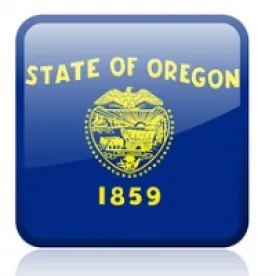Recently, Oregon issued clarification pertaining to the classification of hard seltzers in the state. The guidance, as summarized below, impacts the majority of hard seltzers in the market. Classification of hard seltzer has a number of impacts, most notably on excise tax (or “privilege tax”) rates and licensing needed to produce, import, distribute and sell hard seltzers in the state. Specifically, Oregon has signaled that should the state’s guidance result in the reclassification of a supplier’s hard seltzer product, there may be retroactive tax liability imposed. This alert should assist those engaged in the production or sale of hard seltzer in Oregon in determining whether reclassification is necessary and the implications thereof.
Classifications of Hard Seltzer
“Hard seltzer” must meet the following to be categorized as a malt beverage in Oregon:
- 100% of the alcohol by volume (ABV) is obtained through the fermentation of grain and the ABV is more than 0.5% but not more than 14%; or
- At least 98.5% of the ABV is obtained through the fermentation of grain and the ABV is more than 6% but not more than 14%. Once those criteria are met, not more than 1.5% of the ABV may be obtained through other flavoring agents containing alcohol; or
- At least 51% of the ABV is obtained by the fermentation of grain and the ABV is more than 0.5% and not more than 6%.
Once the criteria above is met, up to 49% of the ABV may be obtained through other flavoring agents containing alcohol.
Oregon relies on the federal definition of “grain” to mean barley, canola, corn, flaxseed, mixed grain, oats, rye, sorghum, soybeans, sunflower seed, triticale and wheat, and the subsequent definition for each grain. This may exclude hard seltzers deriving alcohol primarily through the fermentation of cane sugar from meeting the malt beverage definition in Oregon. The state may require verification that a product claimed to be a malt beverage for tax purposes is in fact produced through the fermentation of grain via the submission of an ingredients list or documentation describing the manufacturing process.
“Hard seltzer” must meet the following to be categorized as a wine in Oregon:
- An alcoholic beverage obtained by the fermentation of vinous or fruit juice, or other fermented beverage fit for beverage purposes, and contains more than 0.5% ABV and does not contain more than 21% ABV.
- Wine may contain distilled liquor and other “non-traditional” ingredients, provided that it does not contain more than 21% ABV.
- “Wine” does not include malt beverage, cider or distilled liquor.
“Hard seltzer” must meet the following to be categorized as a cider in Oregon:
- An alcoholic beverage obtained by the fermentation of the juice of apples or pears; contains more than 0.5% ABV but does not contain more than 8.5% ABV.
- The juice is not required to come only from apples or pears.
- “Cider” may include flavored, sparkling or carbonated water.
- “Cider” does not include malt beverage, wine or distilled liquor.
“Hard seltzer” must meet the following to be categorized as a distilled liquor in Oregon:
- An alcoholic beverage that is other than a malt beverage, wine or cider.
Tax Implications
If a hard seltzer cannot be qualified as a malt beverage in Oregon, it will likely be considered either a wine or a cider and then taxed accordingly. A malt beverage, under ORS 473.030(1), is taxed at the rate of $2.60 per barrel of 31 gallons. For wine, the tax amount is $0.67 per gallon (as per ORS 473.030 (2) & (4)) and an additional $0.10 per gallon for all wines containing more than 14% ABV (as per ORS 473.030 (3)). The tax rate for cider products in Oregon is $2.60 per barrel of 31 gallons under ORS 473.035 (1).
If a manufacturer or importing distributor has reported a hard seltzer product as a malt beverage, but based on this new guidance must reclassify the product to a wine or cider, a manufacturer or importing distributor may be responsible for paying the new tax rate moving forward, as well as be responsible for any tax liability incurred as a result of “misclassification” of the hard seltzer product back to Oregon’s last audit period. If a hard seltzer is classified as a distilled liquor, no privilege tax is assessed. A distilled liquor hard seltzer must be listed with the state and factory-sealed containers of the product are sold at retail in liquor stores or by distillery outlet agents.
Manufacturing, Importation, Wholesale and Retail Implications
The classification of a hard seltzer product impacts who may manufacture, import or sell the product at wholesale or retail in the state of Oregon. If this new guidance impacts the classification of a hard seltzer product, there may be residual licensing implications impacting each tier involved in the production and sale of hard seltzer within the state. Below sets forth what is permissible with regard to hard seltzer based on the type of license or permit held.
Brewery Licensees
-
Manufacturing: A Brewery licensee and/or a Brewery-Public House licensee may make a malt beverage hard seltzer.
-
Importation: A Brewery licensee may import a malt beverage hard seltzer, but only if the malt beverage is of a brand produced by a manufacturer that is under common control with the Brewery Licensee.
-
Wholesale Activities: A Brewery licensee may sell at wholesale and distribute a malt beverage hard seltzer, but only to a Wholesale Malt Beverage and Wine licensee. A Brewery-Public House licensee may sell at wholesale and distribute a malt beverage hard seltzer only if it produced the malt beverage hard seltzer and sells at wholesale and distributes no more than 7,500 barrels of any malt beverage that it produced in a calendar year.
-
Retail (direct to consumer): A Brewery or a Brewery-Public House licensee may sell malt beverage, wine or cider hard seltzer at retail for both on- and off-premises consumption.
Distillery Licensees
-
Manufacturing/Importation: A Distillery licensee may make and may import a distilled liquor hard seltzer. The Oregon Liquor Control Commission (OLCC) may also import a distilled liquor hard seltzer.
-
Wholesale Activities: A Distillery licensee may sell at wholesale and distribute a distilled liquor hard seltzer, but only to the OLCC.
-
Retail (direct to consumer): A Distillery licensee who has also been appointed by the OLCC as a distillery retail outlet agent may sell hard seltzer at retail in a sealed container, but only at retail direct to consumer, and may sell it by the drink for consumption on the premises if the licensee has obtained a Special Event Distillery special event license.
Winery Licensees
-
Manufacturing: A Winery licensee may make a wine or cider hard seltzer.
-
Importation: A Winery licensee with a Producer/Blender permit from the Alcohol and Tobacco Tax and Trade Bureau (TTB) may import a wine or cider hard seltzer if the container has a capacity of more than four liters. If the container has a capacity of four liters or less, a Winery licensee may import a wine or cider hard seltzer only if the wine or cider hard seltzer brand is under the control of the Winery licensee. “Control,” as defined by ORS 471.223 (1), means either (a) the licensee owns the brand under which the wine or cider is labeled; or (b) the licensee performs or has the legal right to perform all of the acts common to a brand owner under the terms of a trademark license or similar agreement that for the brand under which the wine or cider is labeled has a term of at least three years. A Winery licensee with a Wholesaler or Wine Cellar permit from the TTB may, regardless of container size, import a wine or cider hard seltzer if the brand is under the control of the Winery licensee.
-
Wholesale Activities: A Winery licensee with a valid Producer and Blender Basic Permit from the TTB may sell at wholesale and distribute a wine or cider hard seltzer. A Winery licensee with a valid Wholesaler Basic Permit from the TTB may sell at wholesale and distribute only hard seltzer made from wine and cider brands that are under the control of the licensee.
-
Retail (direct to consumer): A Winery licensee with a valid Producer and Blender Basic Permit from the TTB may sell hard seltzer at retail for both on- and off-premises consumption. A Winery licensee with a valid Wholesaler Basic Permit from the TTB, may (i) only sell hard seltzer made from wine and cider brands that are under the control of the licensee and may sell it for both on- and off-premises consumption; or (ii) sell hard seltzer made from malt beverage at retail for both on- and off-premises consumption.
Warehouse Licensees
- Importation: A Warehouse licensee may import a malt beverage, wine or cider hard seltzer.
Wholesale Malt Beverage and Wine Licensee
-
Importation: A Wholesale Malt Beverage and Wine licensee may import a malt beverage, wine or cider hard seltzer.
-
Wholesale Activities: A Wholesale Malt Beverage and Wine licensee may sell at wholesale and distribute a malt beverage, wine or cider hard seltzer.
-
Retail (direct to consumer): A Wholesale Malt Beverage and Wine licensee may sell hard seltzer at retail if (i) the product is a wine or cider, and sold in quantities of not fewer than four gallons or more than 55 gallons at any one time. The licensee may not deliver the hard seltzer (the consumer must pick up the product at the licensed premises); or (ii) if the product is a malt beverage, the product is not more than 9% alcohol by volume in quantities not fewer than four gallons. The licensee may not deliver the hard seltzer (the consumer must pick up the product at the licensed premises).
Direct Shipper Permittees
-
Retail (direct to consumer): If the product is a wine or cider hard seltzer, Direct Shipper Permittees may sell and deliver sealed containers of it at retail direct to an Oregon resident. If the product is a malt beverage, Direct Shipper Permittees may sell and deliver sealed containers of hard seltzer at retail direct to an Oregon resident only if the state from which it is coming allows Oregon licensees to delivery malt beverages directly to a resident of that state.
Full On-Premises Sales Licensees
- Retail (direct to consumer): A Full On-Premises Sales licensee may sell wine, cider or malt beverage hard seltzer at retail, but only for on-premises consumption.
Grower Sales Privilege Licensees
- Retail (direct to consumer): A Grower Sales Privilege licensee may sell hard seltzer, but only hard seltzer that is a wine or cider made from fruit or grapes grown in Oregon under the control of the licensee, at retail for both on and off premises consumption.
A Limited On-Premises Sales Licensees
- Retail (direct to consumer): A Limited On-Premises Sales licensee may sell wine, cider, or malt beverage hard seltzer at retail for on-premises consumption. If the hard seltzer is a malt beverage, the licensee may also sell hard seltzer in a keg. A “keg” is a container holding more than seven gallons.
Off-Premises Sales Licensees
- Retail (direct to consumer): An Off-Premises Sales licensee may sell wine, cider or malt beverage hard seltzer at retail, but only for off-premises consumption.





 />i
/>i

